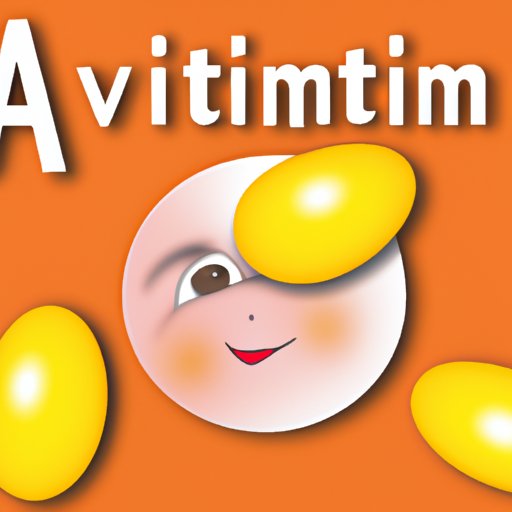
I. Introduction
Vitamin A is an essential nutrient that plays a crucial role in maintaining good health. It is a fat-soluble vitamin that can be found in various foods and supplements. In this article, we will explore the benefits and risks associated with Vitamin A to help you understand what it does for your body and why it’s important to include it in your diet.
II. Vitamin A: Essential Nutrient for Good Vision and Immune System
Vitamin A is essential for maintaining good vision as it helps the eyes adjust to changes in light, compensates for poor lighting, and prevents night blindness. It’s also essential for a healthy immune system as it supports the development and function of immune cells that help fight infections.
III. Top 5 Sources of Vitamin A and How to Incorporate Them in Your Diet
The top 5 food sources of Vitamin A are liver, sweet potato, spinach, carrots, and squash. These foods can be incorporated into your diet by roasting, baking, or steaming them. Adding spinach to salads or smoothies, snacking on carrots, or making a sweet potato casserole are great ways to ensure you’re getting enough Vitamin A.
IV. Vitamin A Deficiency: Symptoms, Causes, and Prevention
Vitamin A deficiency can cause symptoms such as night blindness, dry eyes, and skin issues. It can be caused by inadequate intake, malabsorption, or liver dysfunction. To prevent a deficiency, it’s important to include Vitamin A-rich foods in your diet, take supplements if necessary, and get regular medical check-ups.
V. How Vitamin A Can Improve Your Skin Health
Vitamin A plays a vital role in maintaining healthy skin by increasing collagen production, reducing wrinkles, and improving skin texture. It’s often used to treat skin conditions such as acne, psoriasis, and eczema. Eating foods high in Vitamin A and applying topical Vitamin A are great ways to improve skin health.
VI. The Role of Vitamin A in Pregnancy and Child Development
Vitamin A is crucial during pregnancy as it supports proper fetal development, protects against birth defects, and supports the immune system of both the mother and the fetus. It’s also essential for child development as it’s needed for growth, vision, and immune function.
VII. Vitamin A vs. Beta-Carotene: What’s the Difference and Which is Better?
Vitamin A and beta-carotene are both forms of Vitamin A that can be found in food and supplements. However, beta-carotene is a precursor to Vitamin A and needs to be converted by the body to be used. While both forms have benefits, it’s important to understand that high doses of Vitamin A can be toxic, whereas beta-carotene is not toxic even in high doses.
VIII. Risks and Benefits of Taking Vitamin A Supplements
Some benefits of taking Vitamin A supplements include reducing the risk of certain cancers, supporting vision and immune function, and improving skin health. However, taking too much Vitamin A can lead to toxicity, which can cause nausea, dizziness, and even liver damage.
IX. Conclusion
In conclusion, Vitamin A is an essential nutrient that plays a crucial role in maintaining good health. From supporting good vision and a healthy immune system to improving skin health and child development, there are plenty of reasons to prioritize getting enough Vitamin A in your diet. Make sure to consume it through Vitamin A-rich foods and supplements in a safe and controlled manner.




